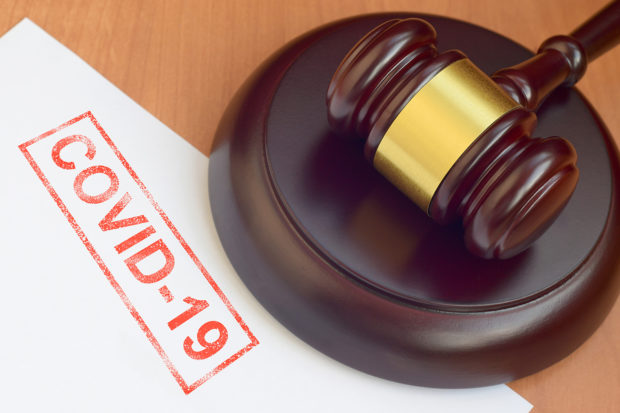A federal judge has dismissed 32 lawsuits over COVID-19 business interruption insurance claims against Erie Insurance, concluding the claimants failed to “plausibly plead” that they are entitled to coverage under their Erie policies.
The ruling by U.S. District Judge Mark R. Hornak in western Pennsylvania reflects the opinions of other courts that have rejected allegations that COVID-19 viruses and government shutdowns cause direct physical damage and loss that triggers business interruption coverage. The opinion also reflects the analysis the same judge gave in dismissing similar claims against Cincinnati Insurance, Travelers Insurance and Hartford Financial Services.
Plaintiffs in this multidistrict litigation included retail stores, restaurants, car dealerships, hair salons and dental practices located in the District of Columbia, Illinois, Maryland, New York, Ohio, Pennsylvania, Tennessee, Virginia and West Virginia. Each plaintiff had an “all risk” commercial property insurance policy with Erie that was either the Ultrapack Plus Policy or the UltraFlex Policy.
While their businesses may be different, their legal claims were similar to those asserted by business owners in a multitude of similar cases nationwide. The Erie cases were consolidated under Judge Hornak in January 2021.
Both Erie policies cover direct physical loss or damage to covered property resulting from an insured peril. Both policies contain a “law or ordinance” exclusion. The UltraFlex also contains a virus exclusion.
After Erie denied their claims, the plaintiffs filed suits alleging that Erie wrongfully denied them coverage under the income protection, extra expense, civil authority, dependent property, and/or sue and labor coverage provisions. They asserted two covered causes of direct physical loss or damage: the COVID-19 virus itself and the mandated shutdown rules issued by governments to mitigate spread of the virus.
The parties’ primary dispute, as in many other cases, was whether those events caused “direct physical loss of or damage to” covered property.
Erie argued that “direct physical loss of or damage to” property unambiguously “requires a tangible, concrete physical harm” to the property, which “cannot be plausibly alleged” by the plaintiffs. The judge agreed.
The district court considered the laws and rulings from the various plaintiffs’ states where similar cases have been decided, noting that while no high court in those states has yet ruled, other courts have and the “near-uniform dismissal” of claims like plaintiffs’ applying the law of the jurisdictions involved in this MDL presented an “uphill precedential path” for the claimants. Hornak said the central question was whether those decisions were “correct predictions of how the involved jurisdiction’s highest court would decide claims” that mirror those of plaintiffs.
The court said there is “not a persuasive basis” to conclude that these cases were not soundly decided and are not reliable indicators of the path the federal court should follow.
The court rejected the claimants’ allegations that the virus particles can become affixed to and remain stable on surfaces for hours or from one to 14 days, and in that way “change” the surfaces. “[T]he natural plausible inference from those allegations is that the virus particles dissipate on their own, after those numbers of hours or days have passed, without any human intervention. Based on those allegations, the impact that COVID-19 virus particles have on property on which it is present is wholly unlike the impact that, say, a fire that burns all or part of a structure has on property where a fire has occurred,” the opinion states.
The court also rejected the argument that the absence of a virus exclusion in some policies means coverage should be provided under those policies.
The court also denied the plea that Pennsylvania’s reasonable expectations doctrine in insurance law entitles a policyholder to coverage based on the policyholder’s reasonable expectations even if the terms of the insurance contract clearly and unambiguously preclude coverage.
The court concluded: “[I]t is self-evident that the COVID-19 pandemic has had detrimental consequences to people all over the world that cannot be overstated. However, it can also be accurate that the Erie Policies to which the Plaintiffs in this MDL were parties do not provide coverage for the additional consequences that Plaintiffs assert that they as property and business owners suffered as a result of the pandemic and the associated government orders limiting how the properties could be used.”





















 From Skill to System: The Next Chapter in Insurance Claims Negotiation
From Skill to System: The Next Chapter in Insurance Claims Negotiation  New Texas Law Requires Insurers Provide Reason for Declining or Canceling Policies
New Texas Law Requires Insurers Provide Reason for Declining or Canceling Policies  AI Got Beat by Traditional Models in Forecasting NYC’s Blizzard
AI Got Beat by Traditional Models in Forecasting NYC’s Blizzard  Viewpoint: Runoff Specialists Have Evolved Into Key Strategic Partners for Insurers
Viewpoint: Runoff Specialists Have Evolved Into Key Strategic Partners for Insurers 
